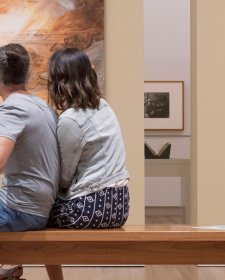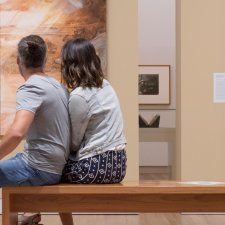Fiona Stanley on her career as a paediatric epidemiologist, and working with Aboriginal communities.
My dream as an eight-year-old was that I would sail the oceans and drop into all of the islands. Hilarious. I'm pleased that I had this kind of childhood and I'm pleased that I lived when I've lived because I think I've had the best of many things. Opportunities and, you know, the beginning of the, my career started at the beginning of the sort of feminist movement when, you know, really things were more supportive of women. I've really enjoyed this era that I've been in and observed all the changes and the dramatic changes in our society, which have been very important in the kinds of work that I've done. I wanted to be the perinatal epidemiologist, the maternal and child epidemiologist of Australia. So that was my agenda.
One of the first big studies we did because we thought it was the most important question to address was why there was such variability in neural tube defects, spina bifida, anencephaly, encephalocele, horrible defects. Epidemiologists love things that go up and down because if it's going up, it can come down. And what are the factors? Well, one of the factors that looked really promising was maternal diet. So we did this very good case control study. Carol Bower was leading it. Well, she was doing her PhD. I said to her, "This is gonna be your PhD." And she then did this for her PhD. So that really was fantastic. And what Carol did with my team was we set up the first, the world's first primary prevention programme for neural tube defects in Western Australia. And we found this incredible association of maternal diet in the three months leading up to the, you know, first trimester of protection if you had a diet that was rich in folic acid, which is a B vitamin. Well, it was stunning results. So people don't even sort of think about it now. Everyone takes folate if they want to get pregnant. You know, how exciting. And, you know, it's very unusual to get a primary prevention for a birth defect. So exciting. And that's why alcohol is important and foetal alcohol syndrome is so important. That's the big defects that we're working on now. And it took us, again, years to get a little label on a wine bottle with a pregnant lady, you know, red pregnant lady with a cross through her because it was a red and it was gonna be difficult to print the labels. Give me a break. Most countries now have labelling on bottles to encourage women to not drink in the pregnancy. Right?
And the other thing that I look back on and I'm still enjoying is a very large number of Aboriginal researchers that we have grown and who are now succeeding all over Australia, but, you know, in lots of different places, and they are now leaders in research. And that stemmed from a question I put to the Aboriginal controlled health organisations in Western Australia in the late 80s, early '90s. And I said, "Look, you know, we're not a service provider. We're a research institute. What do you want to be, you know, what do you want us to be for you?" And they said, "We want you to be our mother." And a mother gives to her child all the love and support and the knowledge and the funds and everything else so that that child can go out into a world which is pretty tough and cope. And so what we did was train all these Aboriginal researchers. Well, it's been the most interesting and wonderful thing for me because I have got completely different perspective on what health is in Aboriginal communities and what love is and what respect is and it's just changed my life. So I have this wonderful friendships with all these Aboriginal researchers and have got the ability, therefore, to use all of the research findings that we've had in all of the areas of research to advocate and lobby for things like Aboriginal control of services or, you know, the way that Aboriginal people do research and how different it is. And when they lead it, of course, it works. That's been a very rewarding experience for me but also one that I think was very important for Aboriginal health nationwide.
I have to say that early on in my career, I didn't get a lot of mentoring, which is why I'm now so keen on mentoring young people myself. And it's much tougher now. I had a dream run with grants. I was asked to go on committees early on in my career 'cause they needed a woman. And so that was hugely beneficial to me because I found out how NHMRC worked and I found out how the ARC worked and I found out how government worked because I was on the Prime Minister's Science Council for years. And that was incredibly important 'cause we could lobby, we could advocate, and so on. I actually do group mentoring now with groups of young people and I think that's very beneficial and I would've appreciated more of that. Sometimes you felt very lonely as being a working mom, as being an institute director, you know, as a woman. So, yeah, I often felt lonely. I had a fantastically supportive husband who half the good ideas in the institute were his ideas. He was just very supportive. I know.
- Explain a bit more.
Maybe I was Italian in a previous life. But no, I get so enthusiastic. You somehow you need your hands to explain things. Not that there's graphs and things, but sometimes I do that. But yeah, so she did capture that and capture that sort of, I guess, enthusiasm for things. The other thing is that I always wore a reconciliation badge, and that was a very obvious one. It had Aboriginal designs on it. And even at every single minister's meeting or the science meetings or anything else, I wore that. I wore it when I was made Australian of the Year so that it was a statement and, you know, that was very important for me. But she captured that too. That is very obvious on the red jacket, I think, in the portrait, mm. From Perth, from little old Perth. Just shows you, you can do it. And it's a great place to do research because of the databases and because of the contained population and because of Telethon. Because of Telethon, everyone knows about our research. Everyone knew who I was. It was fantastic.
Related people
Related information



The Gallery
Visit us, learn with us, support us or work with us! Here’s a range of information about planning your visit, our history and more!



Support your Portrait Gallery
We depend on your support to keep creating our programs, exhibitions, publications and building the amazing portrait collection!



Plan your visit
Information on location, accessibility and amenities.





